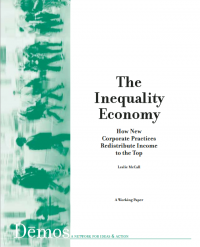The link between corporate practices and the economic security of Americans has become a major focus of public debate over the past several years. The off-shoring of new kinds of jobs has garnered the most attention, but cutbacks in employee health benefits and the under funding of pension plans has also drawn scrutiny at a time when corporate profits have been robust and executive mismanagement has been widespread.
Recent changes in corporate practices -- and the new economic anxieties that result -- continue a trend that began more than thirty years ago. Since the heyday of the large conglomerate firm in the 1960s, corporations have restructured and re-engineered, decentralized and networked, divided and merged, downsized and up-sized. Whereas once managers resisted such changes, now the stock market is firmly in charge. Some call this a shift from managerial capitalism to investor capitalism. Others call it a shift from financial control to shareholder control.1 Whatever one calls it, no one questions a generational shift in the business strategy of corporate America. A new and more market-centered model has emerged, tarnished only slightly by the scandals and the recession.
